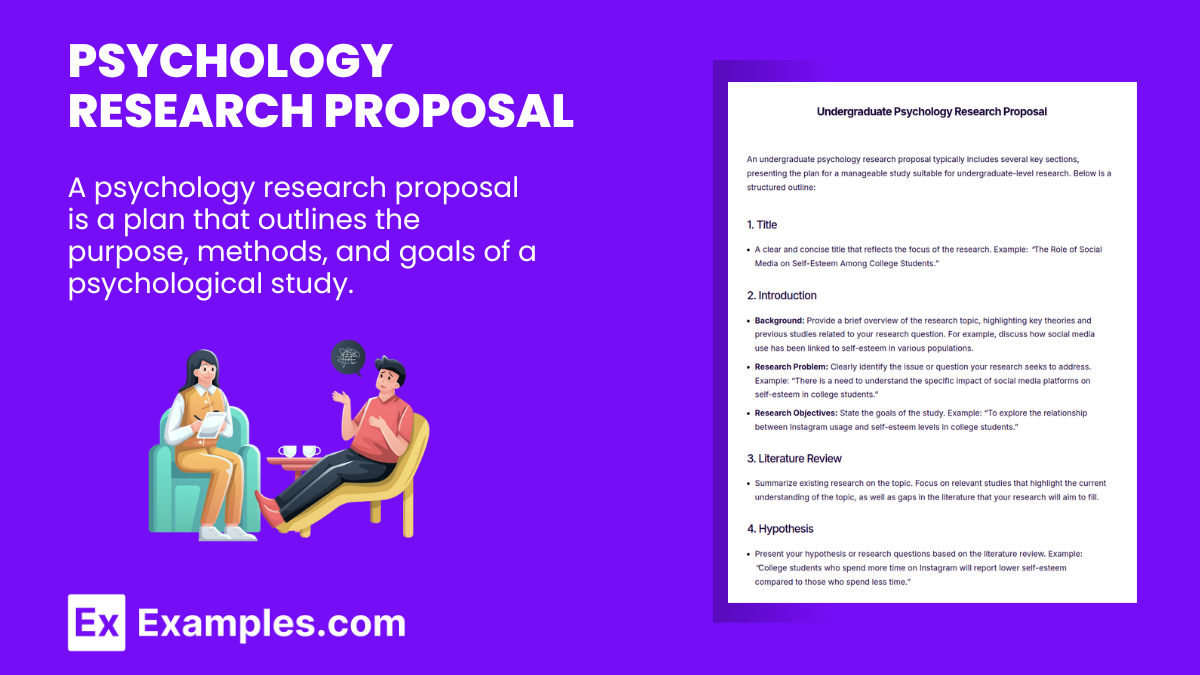11+ Psychology Research Proposal Examples to Download
Proposals, whatever they may be, may it be a wedding proposal, business proposal, or a research proposal, all have a similar goal. It is to hear the word “yes” from the mouths of the recipient. Despite that, these proposals give different feelings to the proposer. If you are here to get tips on coming up with a research proposal, you get what I mean. Don’t worry, this article will help you get ideas on how to devise your psychology research proposal.
What is Psychology Research Proposal?
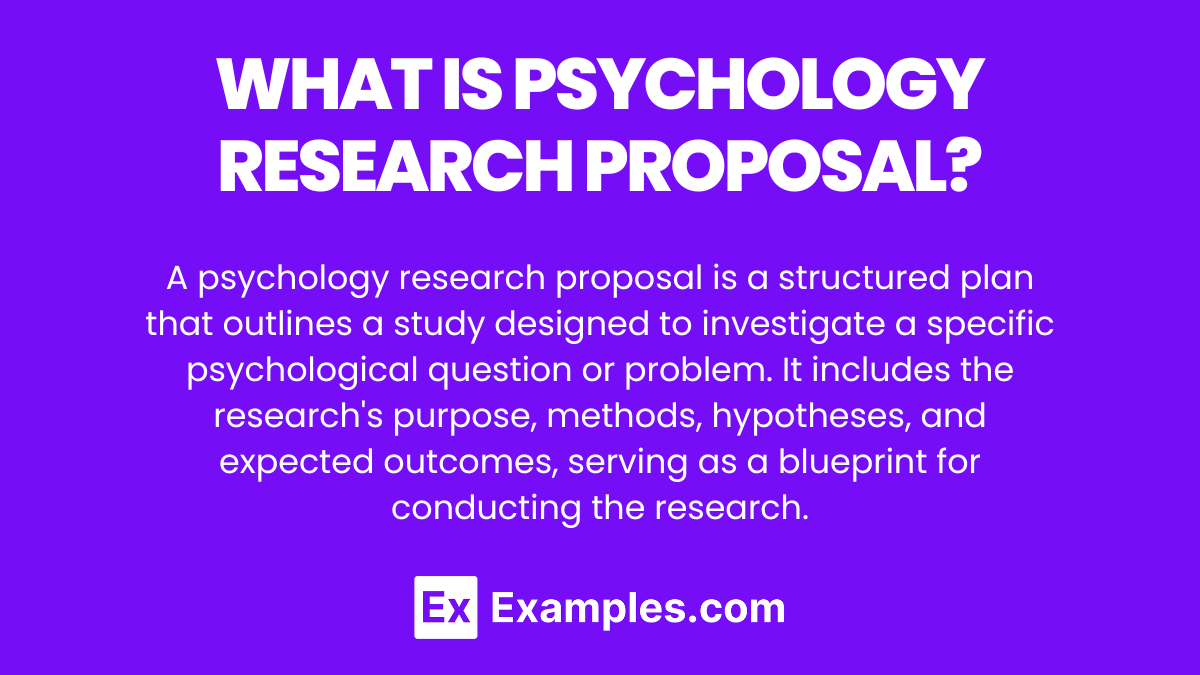
Psychology Research Proposal Bundle
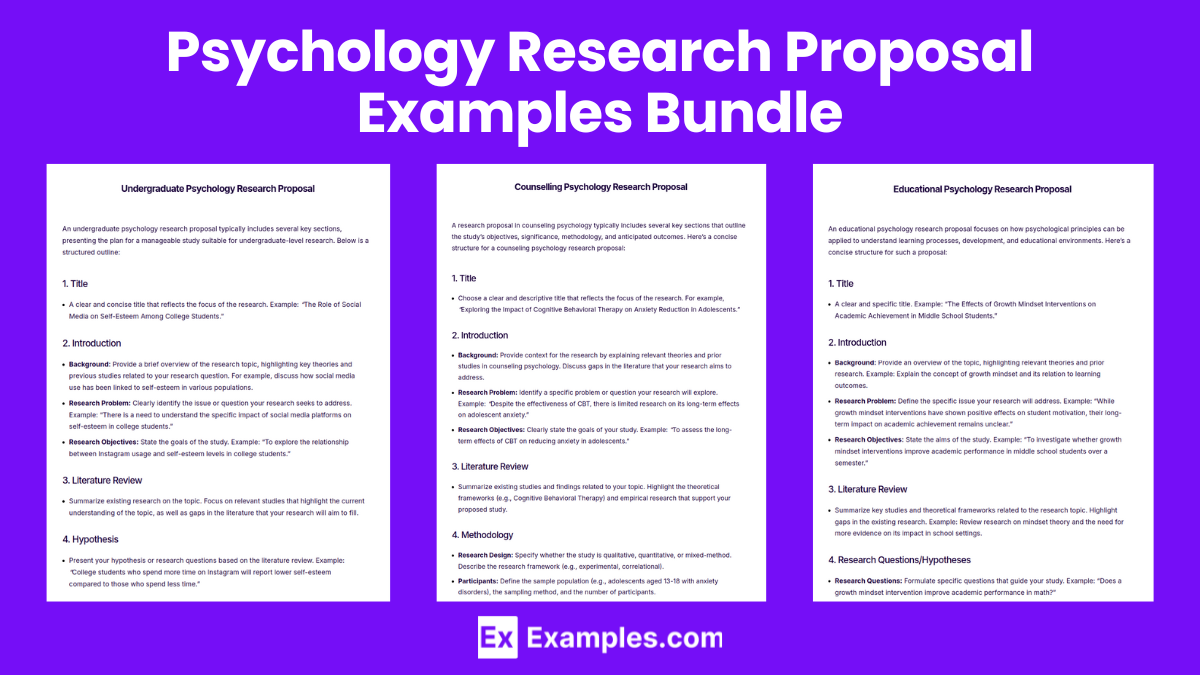
Download Psychology Research Proposal Bundle
Psychology Research Proposal Format
Opening Remarks
Greeting: Begin with a respectful and engaging greeting.
Introduction
Purpose: State the purpose of your psychology research proposal clearly.
Background and Significance
Context: Briefly explain the background and why the psychology research is important.
Research Question
Focus: Present the central research question or hypothesis of your psychology proposal.
Methodology
Approach: Explain the methodology you intend to use in conducting the psychology research.
Expected Outcomes
Predictions: Discuss the potential findings and their implications in the context of psychology.
Acknowledgments
Supervisors and Mentors
Recognition: Thank your psychology research supervisors and mentors for their guidance.
Participants
Appreciation: Acknowledge the participants who will contribute to the psychology study.
Closing Remarks
Summarize: Briefly recap the key aspects of the psychology research proposal.
Final Thanks: Offer a final word of thanks.
Example: “Thank you for your time and consideration of my psychology research proposal.”
Farewell
Goodbye: End with a polite farewell.
Psychology Research Proposal Example
Title: Exploring the Relationship Between Social Media Usage and Self-Esteem in Adolescents: A Cross-Sectional Study
Introduction:
The rise of social media has revolutionized how people communicate, especially among adolescents. While social media platforms offer opportunities for social interaction, concerns have emerged regarding their impact on mental health. Self-esteem, a critical psychological aspect of adolescence, may be affected by online activities, where comparison and validation-seeking behaviors are prevalent. Studies suggest that excessive social media usage could contribute to feelings of inadequacy, anxiety, and low self-worth.This proposal seeks to explore the relationship between social media usage and self-esteem in adolescents. By understanding how these two factors interact, this research can provide insights that may inform interventions aimed at mitigating potential negative outcomes related to heavy social media use.
Research Questions:
- What is the correlation between social media usage and self-esteem in adolescents?
- Do different types of social media platforms (e.g., Instagram, TikTok) have varying effects on adolescent self-esteem?
- How do the frequency and nature of social media interactions impact self-esteem?
Hypothesis:
It is hypothesized that adolescents who use social media for more than two hours per day will exhibit lower levels of self-esteem compared to those who use it for less than one hour per day. Additionally, platforms centered on visual content (e.g., Instagram) will have a stronger negative correlation with self-esteem than text-based platforms (e.g., Twitter).
Literature Review:
Several studies have explored the link between social media and self-esteem. Valkenburg et al. (2017) found that adolescents who frequently engaged in social comparison via social media reported lower levels of self-worth. Similarly, recent research by Smith and Anderson (2020) suggests that excessive use of social networking sites correlates with heightened levels of anxiety and decreased self-esteem. However, there is limited research on how specific platforms and the nature of interactions on these platforms (e.g., posting, liking, commenting) impact self-esteem differently.
Methodology:
A cross-sectional study design will be used. A sample of 500 adolescents aged 13-18 will be recruited from various high schools. Participants will be asked to complete a survey consisting of:
- Social Media Usage Questionnaire: Participants will self-report their daily time spent on different social media platforms, types of activities engaged in (posting, liking, commenting), and the primary purpose of social media use (e.g., social interaction, information seeking).
- Rosenberg Self-Esteem Scale: A widely-used measure of self-esteem consisting of 10 statements assessing overall self-worth.
Data will be analyzed using multiple regression analysis to identify correlations between the variables and to control for confounding factors such as age, gender, and socioeconomic status. A moderation analysis will also be conducted to explore how the type of platform affects the relationship between usage and self-esteem.
Ethical Considerations:
All participants will provide informed consent, and for minors, parental consent will be obtained. Confidentiality will be maintained throughout the study, and participants will have the option to withdraw at any time without penalty. The survey will not collect identifying information.
Expected Results:
It is anticipated that the results will show a negative correlation between time spent on social media and self-esteem levels, particularly on platforms focused on visual content. Adolescents who engage in frequent social comparison or validation-seeking behaviors on these platforms are expected to report lower self-esteem scores.
Implications:
Understanding the impact of social media on adolescent self-esteem could have important implications for mental health interventions. If a strong negative relationship is found, it may support the development of educational programs that encourage healthy social media habits and the fostering of offline self-esteem-building activities.
Conclusion:
This research aims to provide a clearer understanding of how social media usage influences adolescent self-esteem. By identifying specific patterns and effects, it can contribute to the development of practical interventions aimed at improving the mental health of adolescents in the digital age.
Short Psychology Research Proposal Example
Title: The Impact of Social Media on Adolescent Self-Esteem
Introduction:
Social media use among adolescents has rapidly increased in recent years, raising concerns about its effects on mental health. This study aims to examine the relationship between social media usage and self-esteem in adolescents aged 13-18. Specifically, it seeks to determine if frequent social media users have lower self-esteem compared to those who use it less frequently.
Hypothesis:
Adolescents with higher social media usage will report lower levels of self-esteem compared to those with minimal usage.
Methodology:
A sample of 200 adolescents will be recruited from local high schools. Participants will complete a questionnaire that assesses their daily social media use and self-esteem levels using the Rosenberg Self-Esteem Scale. Data will be analyzed using regression analysis to determine the correlation between social media usage and self-esteem.
Expected Results:
It is expected that increased social media use will be associated with lower self-esteem in adolescents.
Undergraduate Psychology Research Proposal
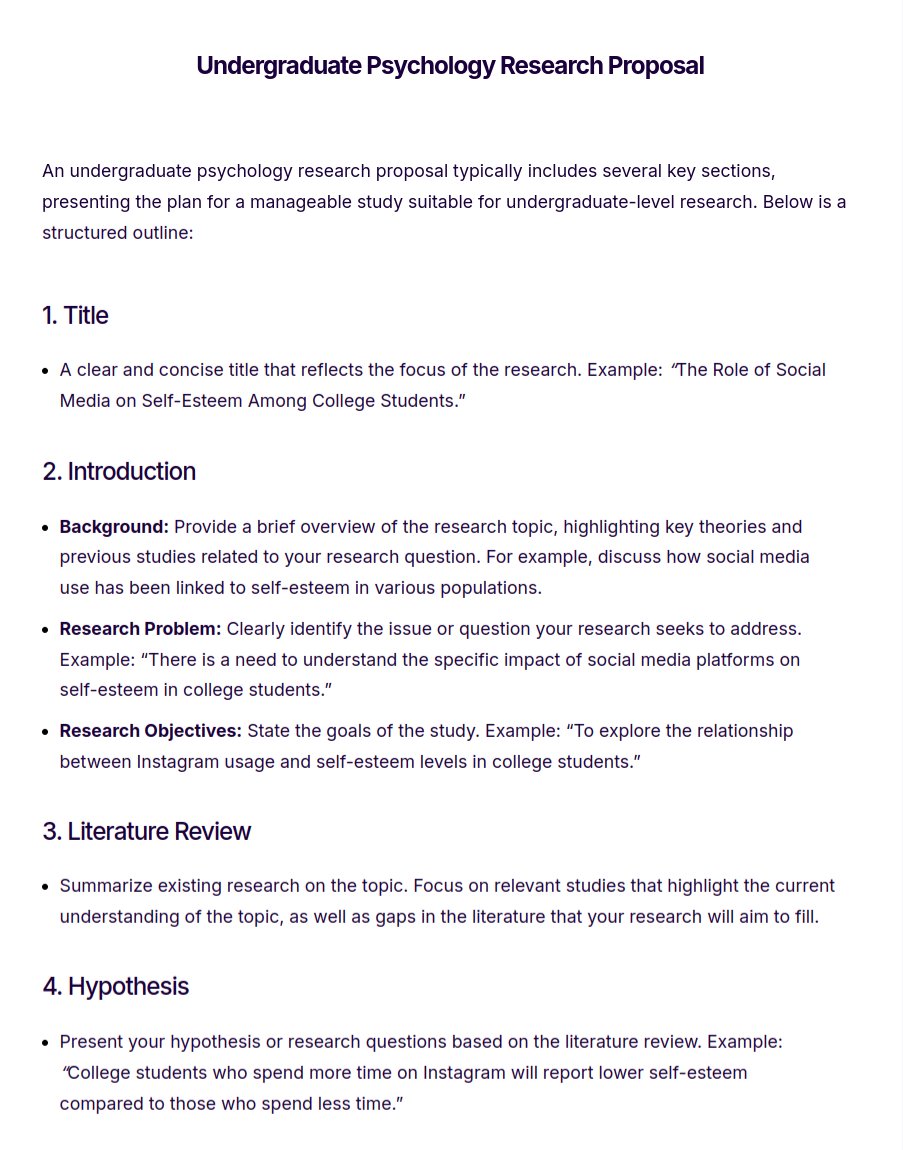
Counselling Psychology Research Proposal
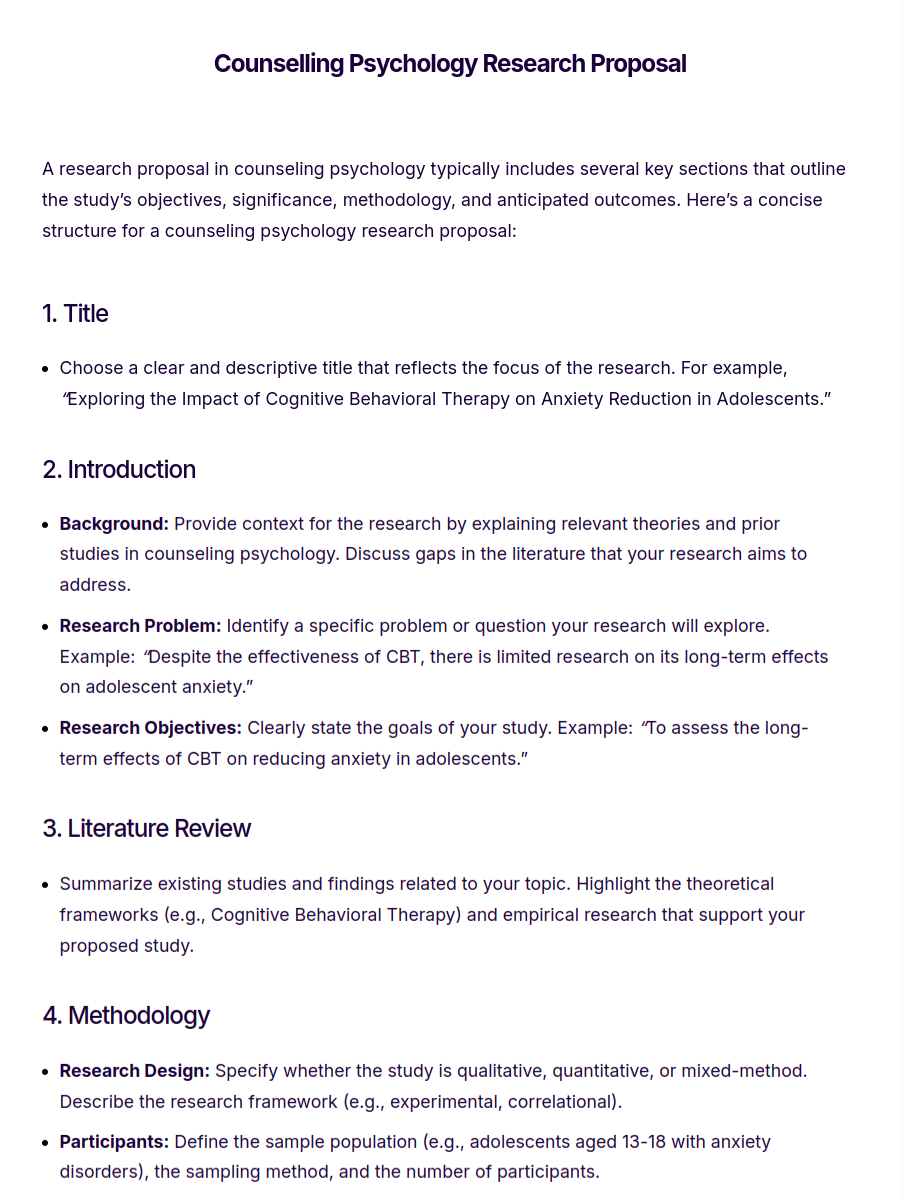
Educational Psychology Research Proposal
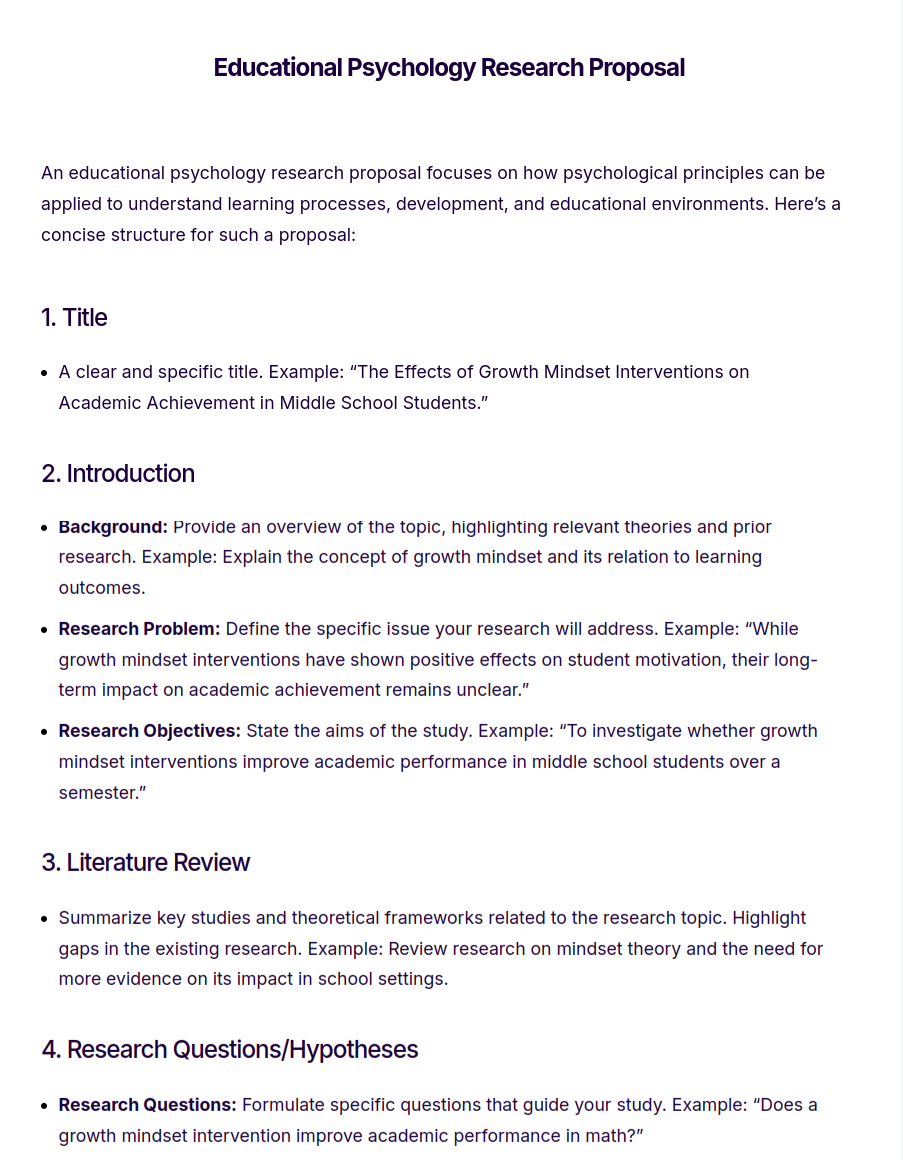
More Psychology Research Proposal Examples and Samples
- Clinical Psychology Research Proposal
- Psychology Quantitative Research Proposal
- Psychology Research Proposal For Students
- Psychology Qualitative Research Proposal
- Criminal Psychology Research Proposal
Psychology Research Proposal Examples
1. Cognitive Psychology Research Proposal
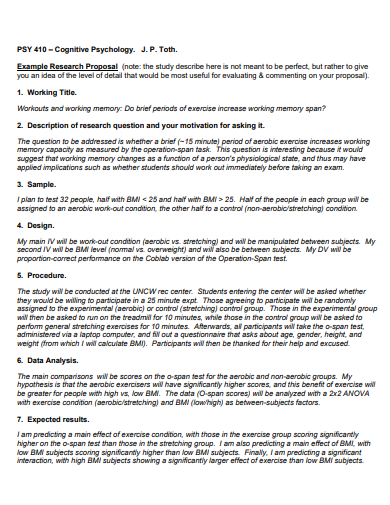
2. PhD Psychology Research Proposal
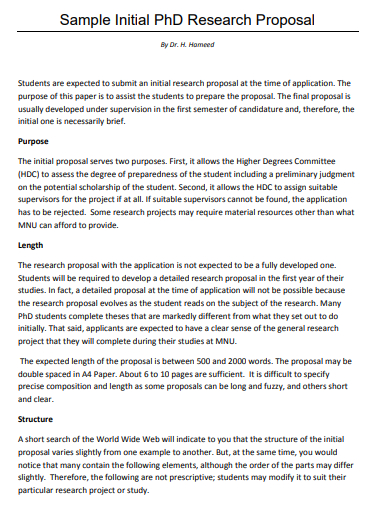
3. Social Psychology Research Proposal
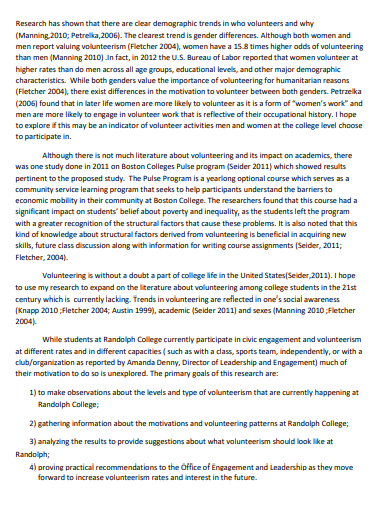
4. Psychology Research Grant Proposal
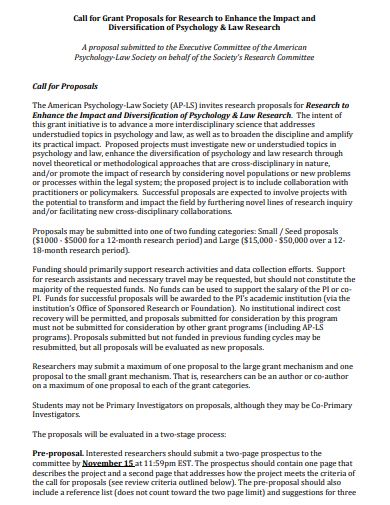
How to Write Psychology Research Proposal?
Writing a psychology research proposal involves outlining your planned study to demonstrate its purpose, methodology, and potential contribution to the field. Here’s a concise guide on how to structure it:
Title
Choose a clear, concise title reflecting the research focus.
Abstract
Provide a brief summary of the research, including the problem, objectives, methods, and expected outcomes (150-250 words).
Introduction
Background and significance: Describe the context of the research and why it’s important.
Research problem: Clearly state the issue your research will address.
Literature review: Summarize relevant studies and explain how your research will contribute.
Research question/hypothesis: Present your research question or hypothesis.Methodology
Participants: Describe the target population and sample size.
Design: Outline the research design (e.g., experimental, correlational).
Materials/Measures: List the tools, tests, or surveys you’ll use.
Procedure: Explain how the study will be conducted.
Data analysis: State how you’ll analyze the data (e.g., statistical tests).Ethical Considerations
Address consent, confidentiality, and how you’ll ensure ethical treatment of participants.
Timeline
Provide a schedule for each stage of the research process.
Budget (if applicable)
List the expected costs and funding sources (if required).
Purpose of Psychology Research Proposal
The purposes of a psychology research proposal are:
- Define the Research Problem: Clarify the specific issue or question that the study will address, highlighting its significance in the field of psychology.
- Demonstrate Research Feasibility: Outline a clear, structured plan that shows how the study will be conducted, including methods, participants, and data collection strategies.
- Review Existing Literature: Provide a background by reviewing past research, establishing the need for the study, and demonstrating how the research will fill gaps or contribute to existing knowledge.
- Guide the Research Process: Serve as a roadmap for the researcher, outlining each step, from participant recruitment to data analysis.
- Obtain Approval and Funding: Convince ethics boards, supervisors, or funding bodies of the study’s value, ethical considerations, and feasibility.
- Assess Potential Contributions: Show the potential academic, clinical, or practical impact of the research on the field of psychology.
Tips for Psychology Research Proposal
Here are some tips for writing a successful psychology research proposal:
- Start with a Strong Title: Choose a concise, specific title that reflects the core of your research question or hypothesis.
- Define a Clear Research Problem: Clearly state the research problem or question early in the proposal. It should be specific, relevant, and focused on a gap in the existing literature.
- Review Relevant Literature Thoroughly: Provide a strong literature review that highlights what has been done on the topic and justifies the need for your research. Show how your study will contribute to existing knowledge.
- Be Precise in Your Methodology: Clearly explain your research design, participant selection, data collection methods, and data analysis techniques. This section should demonstrate that your study is feasible and methodologically sound.
- Justify Ethical Considerations: Make sure you address ethical issues, such as participant consent, confidentiality, and the welfare of participants, to meet institutional requirements.
- Keep it Organized and Concise: Use clear headings and subheadings, and avoid unnecessary jargon. Present your ideas in a logical, straightforward manner.
- Include a Realistic Timeline and Budget: If required, outline a timeline for your study and a detailed budget, ensuring that both are reasonable and achievable.
- Be Prepared for Criticism and Revisions: Expect feedback from supervisors, committees, or reviewers, and be open to refining your proposal based on their suggestions.
- Highlight the Contribution to Psychology: Emphasize the significance of your study and how it can contribute to psychological theory, practice, or policy.
- Proofread and Follow Formatting Guidelines: Ensure your proposal is free of grammatical errors, follows the required format (such as APA style), and is neatly presented.
FAQs
Why is a research proposal important in psychology?
A research proposal helps clarify the research focus, ensures the feasibility of the study, secures ethical approval, and provides a roadmap for conducting the research. It also demonstrates the potential contribution of the study to the field.
How long should a psychology research proposal be?
The length depends on the requirements of your institution or funding body. Generally, proposals range from 5-20 pages, including all sections and references.
How do I secure funding for my psychology research?
If you need funding, include a detailed budget in your proposal and apply to relevant funding agencies, academic institutions, or grant programs. Your proposal should clearly explain the value and feasibility of your research to potential funders.
What are common ethical concerns in psychology research proposals?
Common concerns include ensuring informed consent, protecting participant confidentiality, avoiding harm or distress, and offering the right to withdraw from the study at any time. Addressing these concerns is essential for obtaining approval from an Institutional Review Board (IRB).
Can I use secondary data for my psychology research proposal?
Yes, using secondary data is acceptable if it’s relevant to your research question. In your proposal, explain why secondary data is appropriate, how it will be used, and any limitations it may have.


